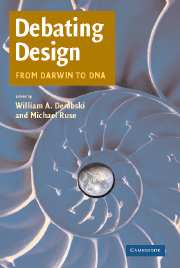4 - Design without Designer
Darwin's Greatest Discovery
Published online by Cambridge University Press: 05 June 2012
Summary
It is also frequently asked what our belief must be about the form and shape of heaven according to Sacred Scripture. Many scholars engage in lengthy discussions on these matters…. Such subjects are of no profit for those who seek beatitude, and, what is worse, they take up very precious time that ought to be given to what is spiritually beneficial. What concern is it of mine whether heaven is like a sphere and the earth is enclosed by it and suspended in the middle of the universe?… In the matter of the shape of heaven the sacred writers… did not wish to teach men these facts that would be of no avail for their salvation.
Saint Augustine, The Literal Meaning of Genesis, Book II, Chapter 9New knowledge has led us to realize that the theory of evolution is no longer a mere hypothesis. It is indeed remarkable that this theory has been progressively accepted by researchers, following a series of discoveries in various fields of knowledge. The convergence, neither sought nor fabricated, of the results of work that was conducted independently is in itself a significant argument in favor of this theory.
Pope John Paul II, Address to the Pontifical Academy of Sciences, October 22, 1996SYNOPSIS
I advance three propositions and conclude with two additional arguments. The first proposition is that Darwin's most significant intellectual contribution is that he brought the origin and diversity of organisms into the realm of science.
- Type
- Chapter
- Information
- Debating DesignFrom Darwin to DNA, pp. 55 - 80Publisher: Cambridge University PressPrint publication year: 2004
- 6
- Cited by



